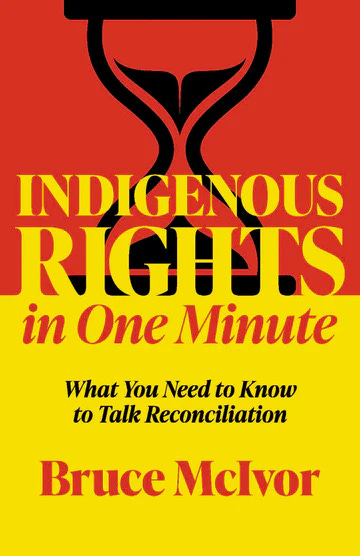Indigenous Rights in One Minute by Bruce McIvor
Reviewed by Lisa Timpf
In Indigenous Rights in One Minute: What You Need to Know to Talk Reconciliation, Bruce McIvor offers basic but broad-ranging information about Indigenous rights and relevant legislation in Canada. McIvor, a member of the Manitoba Métis Federation, is well positioned to write a book of this nature.
McIvor is founder and senior partner at First Peoples Law LLP and an adjunct professor at the University of British Columbia’s Allard School of Law. The book’s “About the Author” section also notes that McIvor is “recognized nationally and internationally as a leading practitioner of Aboriginal law in Canada.”
“Indigenous Rights in One Minute dispels many common misconceptions about treaties and their meanings.”
Indigenous Rights in One Minute is broken into two sections. The first section provides answers to fifty important questions about Indigenous Rights. These questions are the ones McIvor has most often been asked about Indigenous rights, and are drawn from “nearly thirty years of working for First Nations,” as well as courses McIvor has taught and workshops he has conducted across Canada. The questions and answers are broken into sections covering basics, rights, treaties, obligations, and reconciliation.
The book’s second section provides information about the top fifty aboriginal law decisions in Canada and why they are important. Sub-sections include legal decisions about Aboriginal title, Aboriginal rights, treaty rights, fiduciary duty, the duty to consult and accommodate, Métis rights, and emerging issues. Throughout this section, McIvor explains the issues raised and the legal decisions made. He also exposes gaps in logic, and points out where the decisions fall short of effectively addressing issues.
The “One Minute” of the title alludes to McIvor’s strategy in setting up the book. For each individual topic, McIvor includes a title, a brief, high-level explanation, and then a longer, more detailed exploration and analysis. McIvor has attempted “to limit each explanation to what most people can read in a minute.” By chunking the information into small bits, McIvor makes it easier to digest.
As a reader, I found this to be an effective strategy. Breaking items down into small segments also makes for easy reference using the table of contents or the index. The book includes a glossary to further aid in understanding.
Indigenous Rights in One Minute dispels many common misconceptions about treaties and their meanings. McIvor explains why treaties are important, and discusses the Crown’s commitments to Canada’s Indigenous Peoples. McIvor also makes connections between individual cases and decisions they influenced, or were influenced by. McIvor points out that the law is not static, but continuously evolving as new cases arise and new decisions are handed down.
As someone who did not know much about Indigenous rights prior to reading Indigenous Rights in One Minute, I found the book illuminating. Of particular interest were the sections on treaties, the Crown’s obligations toward Indigenous Peoples, Métis rights, and McIvor’s explanation of how law-making works in Canada.
The section on “the Honour of the Crown” was also interesting, providing the background for King George III’s Royal Proclamation of 1763, in which “Britain claimed an interest in the lands of Indigenous Peoples in what is now Canada.” This Proclamation “ignored Indigenous sovereignty and land rights and asserted its own sovereignty without conquering Indigenous people or entering into treaties.”
Because of this, McIvor explains, “there arose what the Supreme Court has described as a ‘tension’ between Crown sovereignty and Indigenous sovereignty and rights.” The Honour of the Crown “requires government to act fairly and honourably in all dealings with Indigenous people.” The Crown’s obligations include the “duty to diligently fulfill constitutional promises” as well as other factors.
To assist those whose appetite has been whetted for more information, McIvor provides references for further reading on topics like Indigenous rights and resistance, National Inquiries and Commissions, Indigenous law, the United Nations Declaration on the Rights of Indigenous Peoples (UNDRIP), and other topics.
Those looking to gain a broad understanding of Indigenous rights in Canada and key legal decisions related to those rights should find McIvor’s book a useful and informative reference.
About the Author
Bruce McIvor is the founder and senior partner at First Peoples Law LLP and an adjunct professor at the University of British Columbia’s Allard School of Law. He is the author of Standoff: Why Reconciliation Fails Indigenous People and How to Fix It (2021). He is a member of the Manitoba Métis Federation. He lives in Vancouver, BC.
About the Reviewer
Lisa Timpf is a retired HR and communications professional whose poetry has appeared in Eye to the Telescope, Star*Line, Triangulation: Seven-Day Weekend, and other venues. Lisa’s speculative poetry collection Cats and Dogs in Space is available from Hiraeth Publishing. You can find out more about Lisa’s writing projects at http://lisatimpf.blogspot.com/. Lisa is also on Bluesky, @lisatimpf.bsky.social
Book Details
Publisher: Nightwood Editions
Language: English
Paperback: 224 Pages
ISBN: 9780889714885




